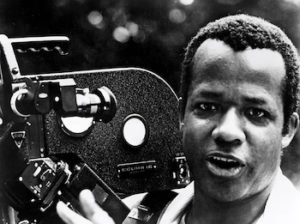
William Reaves
*William Greaves was born on this date in 1926. He was a Black documentary filmmaker and a pioneer of African American filmmaking.
William Greaves was born in Harlem in New York City. He was one of seven children of taxi driver and minister Garfield Greaves and the former Emily Muir. After graduating from the elite Stuyvesant High School at 18, Greaves attended City College of New York to study science and engineering but eventually dropped out to pursue a career in theatre. Starting as a dancer, he eventually began acting, working in the American Negro Theater. In 1948, Greaves joined The Actor's Studio. During this time, he undertook several roles on the stage and in the theatre but eventually grew dissatisfied with the roles in which he was cast.
Seeing that his opportunities would be limited if he stayed in America and focused on his planned acting course, Greaves tried his hand at movie making, electing to move to Canada and study at the National Film Board of Canada. As the 1960s saw the rise of the 20th-century American Civil Rights Movement, Greaves returned to The United States to participate in the ongoing discourse regarding Blacks and their place in American society.
Based on his work on Emergency Ward, he was hired by both the United Nations and the film division of the United States Information Agency (USIA) to make several documentaries, the two most acclaimed of which were Wealth of a Nation, an examination of personal freedom as a key boon to America's strength, and The First World Festival of Negro Arts (1968), which documented the 1966 World Festival of Black Arts, a celebration of both African and African American culture.
On August 23, 1959, Greaves married Louise Archambault, who became a frequent collaborator on his projects. They had three children: David, Taiyi, and Maiya. In 1969, following the 1968 assassination of Martin Luther King Jr., the public broadcasting syndicate National Educational Television began to air a show called Black Journal with a mission to present news by African Americans, for African Americans, and about African Americans.
After a tumultuous opening during the first few tapings, the NET network promoted Greaves from co-host to executive producer of the show. Greaves ran the show until 1970, winning an Emmy award for himself and the show in 1969. In 1970, Greaves opted to leave television to focus on filmmaking. In 1971, he released a film titled Ali, the Fighter. After this, Greaves produced numerous works, including From These Roots, Nationtime: Gary, Where Dreams Come True, Booker T. Washington: Life and Legacy, Frederick Douglass: An American Life, and Black Power in America: Myth or Reality? The Deep North, and Ida B. Wells: A Passion for Justice. Greaves continued producing films from his own production company, including the 1964 documentary film, which he called Symbiopsychotaxiplasm, an experimental, avant-garde film that he shot in the cinéma vérité documentary style 1968.
Between 1969 and 1982, Greaves taught film and television acting at the Lee Strasberg Theatre and Film Institute in New York. While not working, Greaves could be found touring various universities and cultural centers around the world, presenting his films, conducting workshops, and speaking about his experiences in indie film and the process of creating a film as it is to actors, directors, professionals, and more. In 1986, Greaves received an “Indy”—the special Life Achievement Award—from the Association of Independent Video and Filmmakers. In 2001, Greaves released one of his most ambitious works, Ralph Bunche: An American Odyssey. According to Greaves, the film took ten years to make between attempting to secure funds and researching countless old manuscripts, photos, and newsreel footage. The final product was edited down from an initial cut of seventeen hours to two hours for the PBS show American Odyssey.
In 2001, he was honored by the National Black Theater and Film Festival with its first award for Lifelong Achievement in Film and Contributions to Black Theater. That same year, Greaves also received the Distinguished Documentary Maker Award from the New York Film/Video Council and the Lifetime Achievement Award from the International Association of Motion Picture and TV Producers. In 2004, the International Documentary Association awarded Greaves their Career Award, and in 2006, he was honored with the Africana Heritage Award from the Schomburg Center for Research in Black Culture. He produced over two hundred documentary films and wrote and directed more than half of them.
William Greaves, who garnered many accolades for his work, including four Emmy nominations, died at his home in Manhattan on August 25, 2014, at the age of 87.